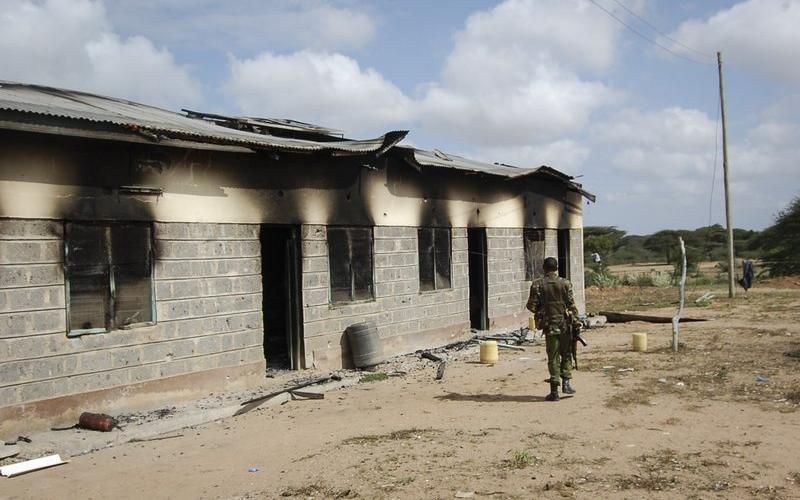
NAIROBI, Kenya (AP) — Al-Shabab extremists killed three people in an assault early Monday in eastern Kenya, its fifth attack in thirteen days, police said.
The militants from neighboring Somalia attacked Kamuthe town in Garissa county at 2 a.m., setting fire to a police post and destroying a telecommunication mast, police said in a report seen by The Associated Press.
Three non-Muslim teachers were killed and a Muslim one was abducted, the report said. Another teacher was wounded. The attackers spared the life of a female nurse due to her gender, it added.
Al-Shabab is claiming responsibility for the attack in a terse statement within its “latest news” posted Monday on its official website, Shahada.
Al-Shabab has vowed retribution on Kenya for sending troops to Somalia since 2011 to fight the militants. The group has carried out numerous attacks on Kenya, killing hundreds.
Earlier this month, the al-Qaida-linked group attacked a military base used by Kenyan and U.S. forces, killing three Americans and destroying aircraft and other machinery.
Since December, al-Shabab has increased the frequency of its attacks in five Kenyan counties that border Somalia and that the government has named as hotspots for extremism. They are Lamu, Garissa, Wajir, Tana River and Mandera counties. Kenya’s security forces have been caught inadequately prepared for the recent attacks in these counties, said security analyst and former U.S. Marine Andrew Franklin, who is a longtime resident in Kenya.
The extremist group, which is based in Somalia, has waged an increasingly effective eight-year violent campaign and the Kenyan government has failed to treat this threat with the seriousness it deserves, said Franklin.
Al-Shabab’s stepped up campaign in the five counties have hampered local authorities by cutting their lines of communication, transportation and by forcing schools to close, Franklin said.
Recent attacks on buses in Lamu county apparently brought China to suspend construction work at Lamu port, said Franklin. Vehicles going to Lamu county already must have a police escort, according to a government directive.
Al-Shabab has resumed destroying telephone masts which will paralyze communications in the affected counties and damage commerce due to disruption in mobile money networks, he added.
Al-Shabab has periodically targeted non-local teachers serving in public schools. Two teachers were murdered in 2018, prompting authorities to close 250 schools in the region, according to a report released in early 2019 by the International Crisis Group.
Some of the schools re-opened but close to 100 schools across the three north-eastern counties bordering Somalia border are operating with a just a headmaster and no other teaching staff, it said.
Recent al-Shabab attacks in Kenya include:
A Dec. 6 attack in which al-Shabab killed 11 people in Mandera county, eight of them police officers returning to duty, who were pulled from a bus.
An attack on Dec. 17 in which the group killed two non-Muslim construction workers in Garissa county and on Dec. 22 the rebels burned construction equipment owned by a Muslim contractor that was being used to develop a road in Mandera county.
A Dec. 27 attack in which two security officers died and seven other policemen were wounded when a roadside bomb tore through their patrol vehicle in Wajir county.
On Jan. 2 al-Shabab claimed responsibility for killing four people in an attack on a convoy of buses and vans being escorted by police in Lamu county.




